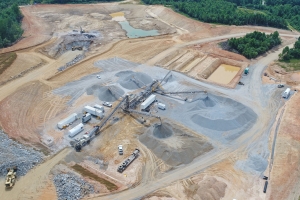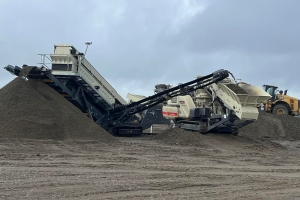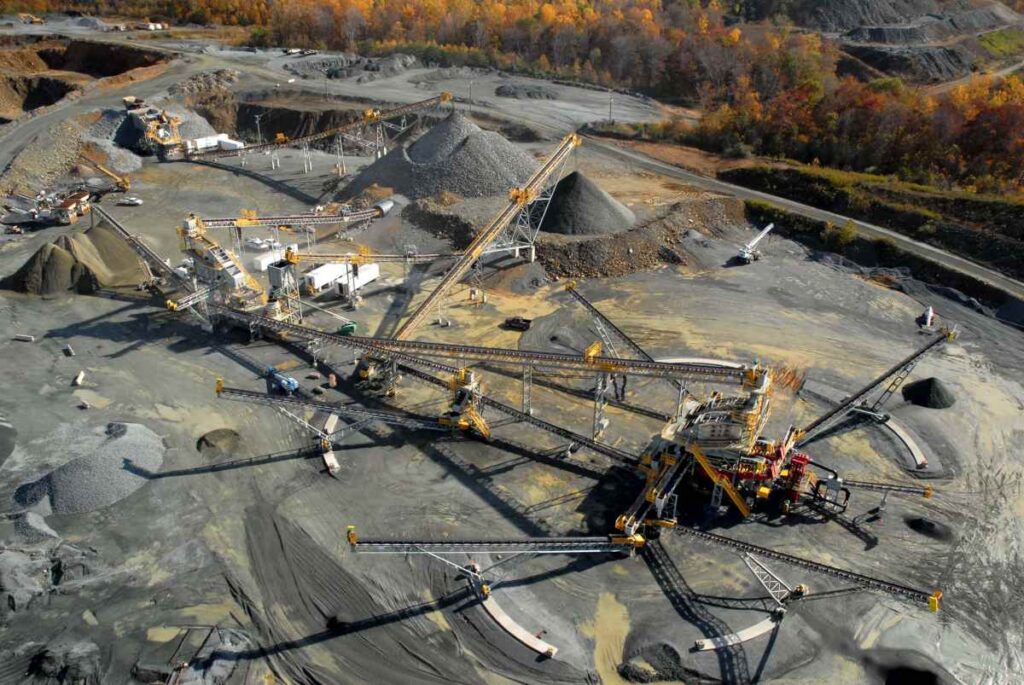Mellott is the East Coast Aggregate Powerhouse, providing rock crushers for sale and rent in Florida, Georgia, Alabama, Tennessee, Virginia, West Virginia, Maryland, Pennsylvania, South Carolina, North Carolina, New York, Ohio, New Jersey, Delaware, Connecticut, Massachusetts, Vermont!
The construction industry has seen immense growth in the use of mobile crushers due to their ability to be moved and utilized at different sites. Mobile crushers offer contractors and companies more flexibility compared to stationary options.
However, stationary crushers still play an important role, especially for high-volume, long-term projects. When selecting a rock crusher for your needs, it is essential to understand the key differences between mobile and stationary units as well as the factors that determine which is the optimal choice.
Mobility and Flexibility
 The most obvious difference between mobile and stationary crushers is in their ability to maneuver to different locations. Mobile crushers are mounted on wheels or tracks, allowing them to be transported and used in various job sites.
The most obvious difference between mobile and stationary crushers is in their ability to maneuver to different locations. Mobile crushers are mounted on wheels or tracks, allowing them to be transported and used in various job sites.
This enables crushing at or near the point of use rather than hauling material to a designated crushing area. The mobility of mobile crushers provides more flexibility in meeting on-site work requirements. You can easily move them around a worksite as needed.
Stationary crushers are fixed in place, usually situated at a quarry or mine. They are limited to one site, so all materials must be brought to them. While stationary units sacrifice mobility, they make up for it with higher production capabilities.
Capacity and Production Levels
In general, stationary crushers can accommodate larger capacities and generate higher productivity. Their heavy-duty construction and durable components empower them to handle increased volumes and sustain continuous crushing operations. This makes stationary units ideal for large, long-term projects that require high output.
Conversely, mobile crushers have smaller capacities suitable for lower quantities of material. Their compact size and wheel-mounted design limit the size and power of their crushing mechanisms.
However, mobile crushers make up for their lack of brute force with versatility. They work well for small to medium jobs or short-term projects.
Cost Comparison
Mobile crushers have higher resale value compared to stationary plants. They also eliminate expenses related to trucking material to and from a designated crushing site. This saves immensely on labor and transportation costs.
On the other hand, stationary crushers do not require permits or licensing associated with highway transportation. Operating costs are lower since they remain in one place and do not consume fuel for movement. Over the long haul, stationary plants deliver substantial savings from reduced overhead.
Ease of Use
Mobile crushers provide quicker setup, installation, and transport than stationary units. Since they arrive at a job site ready to go, mobile crushers can begin production shortly after arrival. Dismantling them takes less time when shifting to a new location.
Although stationary plants require extensive foundations and site prep, their operation is simple and efficient. Once erected, stationary crushers easily integrate into the workflow. The process moves smoothly with minimal supervision.
Factors to Consider When Selecting a Crusher
Several key factors determine whether a mobile or stationary crushing unit is the right choice. Carefully consider the following criteria before investing in a rock crusher.
Project Duration
Is this a short-term project or an ongoing operation? Stationary crushers work better for long-term needs, while mobile units suit temporary jobs. If you need a crusher for a single construction project or short-term rental, choose a mobile unit.
They offer prompt setup and relocation. For permanent aggregate production, a stationary crusher is the way to go.
Location Restrictions
Does the worksite have space limitations or access issues? Stationary crushers require ample room and must remain in one spot. Mobile crushers can maneuver into tight spaces and move as needed. If location or transportation permits are a concern, mobile crushers resolve these issues through flexibility.
Production Volumes
What level of processing capacity do you need? High throughput calls for the brute force of a stationary crusher. Their extra power supports consistent, high-volume crushing.
For lower quantities, a mobile does the job efficiently while retaining portability. Match expected processing requirements to the ideal production rate.
Budget Considerations
 Weigh initial capital costs against long-term savings. While mobile crushers cost more at first, they generate savings over years of use. Stationary plants provide more operating cost efficiency in the long run but have higher startup costs. Compare the ROI of each option based on production goals.
Weigh initial capital costs against long-term savings. While mobile crushers cost more at first, they generate savings over years of use. Stationary plants provide more operating cost efficiency in the long run but have higher startup costs. Compare the ROI of each option based on production goals.
Secondary Processing
Will you need to screen and convey crushed material? Mobile crushers with integrated screening and conveying allow self-contained processing. Stationary units work well for standalone crushing but often lack onboard processing capabilities. Choose mobile for all-in-one crushing and screening.
Choose the Right Rock Crusher for Your Needs with Assistance from Mellott
Determining the best rock crusher comes down to examining the unique needs and limitations of your construction project. Stationary plants are ideal for long-term, high-volume aggregate processing. Mobile crushers provide flexibility for short-term jobs or projects with space restrictions.
Carefully weigh factors such as production requirements, worksite accessibility, project duration, and operational costs. This ensures you select the perfect balance of mobility and crushing productivity.
By gaining an expert perspective now, you save considerable time and trouble down the road. Partnering with an experienced rock crusher distributor such as Mellott provides you with a key competitive edge.
With extensive hands-on experience, Mellott’s team helps contractors make sense of the selection process. Contact us today at 888.621.8533 or online to leverage our years of aggregate industry expertise.

